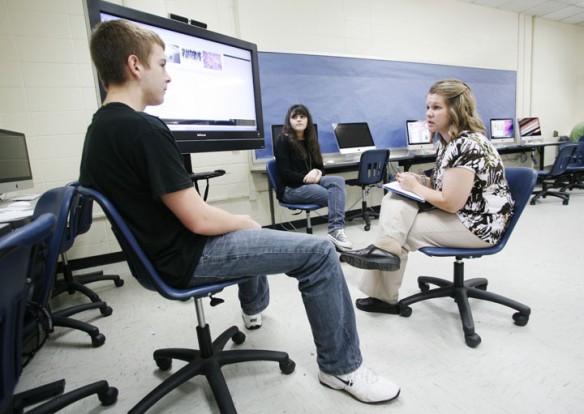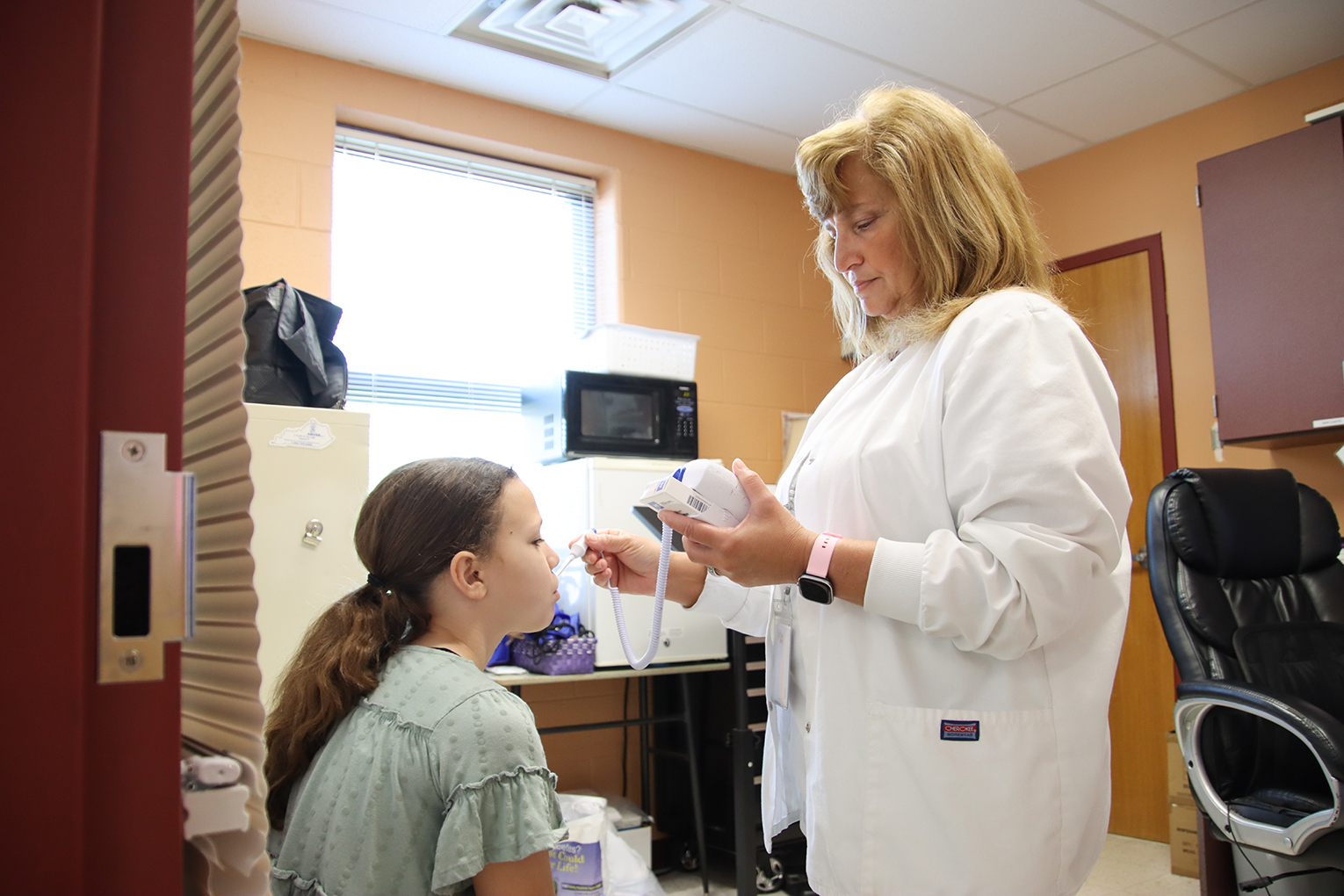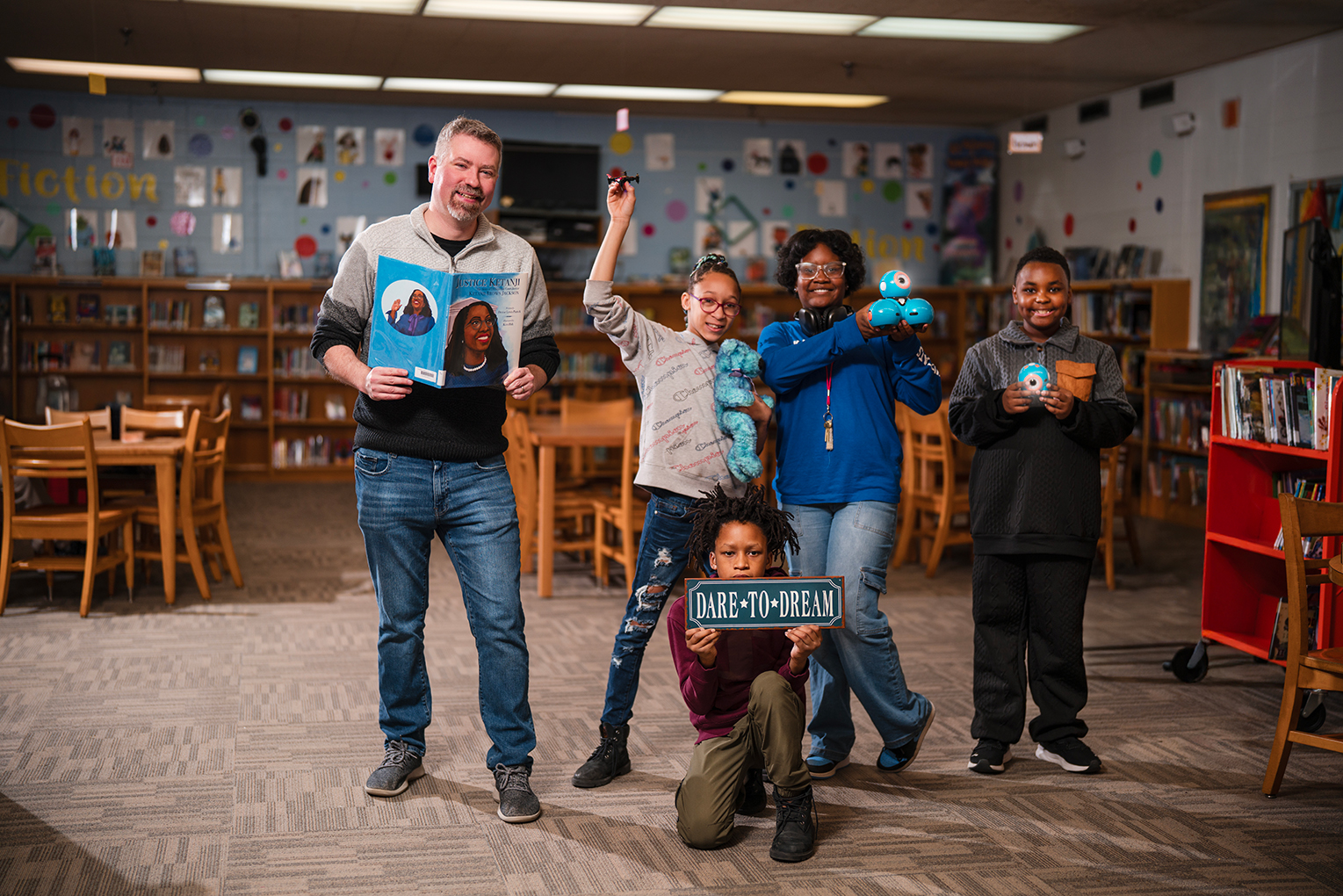
Sophomores Patrick Berry and Tori Wall present the website they created about cold fusion to their teacher Jessica Bevins in the computer lab in the Eagle Studio at Madison Southern High School (Madison County). Photo by Amy Wallot, July 17, 2012
By Susan Riddell
susan.riddell@education.ky.gov
Madison Southern High School (Madison County) isn’t doing just one thing to raise rigor and increase test scores. The school has a handful of initiatives going on that have helped it make great strides recently.
“All these initiatives put a strong focus on academic success on a personal level,” said Erin Stewart, community education director for the Madison County school district.
Heading into its second year, the Eagle Studio initiative has a direct focus on 21st-century learning and college and/or career readiness, and is probably the best example of school collaboration, according to former student life director Josh Williams, who now is an assistant principal at Camp Taylor Elementary School (Jefferson County).
Nearly 150 sophomores attend the Eagle Studio each year. The studio consists of English, geometry, world civilization and earth/space chemical science classes, each taught by one of four teachers who are responsible for running the studio and creating lessons.
Eagle Studio students raised MAP test reading scores an extra two points higher than same-grade students taking traditional classes, and Eagle Studio students reached yearly progress in mathematics on MAP assessment, according to Principal David Gilliam.
Science teacher Jessica Bevins said the sophomores take the classes during the first four periods of the day before heading off to their elective classes.
“All classes in the Eagle Studio are taught using project-based learning,” Bevins said. “In this method, 21st-century skills are integrated daily in classes as well as teaching strategies.”
Student survey data at Madison Southern High indicated 82 percent of students enrolled in project-based learning courses wanted to continue with them the following year, Gilliam said.
The Eagle Studio is 1:1 with iPads for participating students, and each classroom is equipped with an interactive Mondo Pad and wireless access. Students have access to their own Mac lab and conference room when they are working on projects together.
Community partners like Hitachi send in volunteers into the school on a weekly basis to assist teachers in offering students more rigorous projects.
Geometry teacher Robbie Smith said his favorite aspect of the Eagle Studio is watching the students solve problems together.
“As a math teacher, my units used to consist of days of lecture and practice problems and then a paper and pencil test over material,” Smith said. “Now, I give students a problem or a project where they have to learn a specific skill or procedure to succeed. The students research the skill and master the skill in order to complete the project or solve the given problem.
“This has really changed the way I present material in the classroom,” Smith added. “Instead of lecturing at the students, I am now answering questions about a given topic so the students can accomplish their task.”
Bevins also appreciates how the studio has changed her teaching practices.
“We’re placing students in real-world working situations in which they must collaborate to solve problems in creative ways,” Bevins said. “I really enjoy this method of teaching because it challenges me and my students to find relevant problems and their solutions.”
Another successful new program at Madison Southern High is a mentoring program that pairs high school seniors with students at nearby elementary and middle schools.
Prospective mentors must submit an application, letter of recommendation and a student interest survey prior to an interview and selection, and they have to attend mentor and confidentiality trainings. Anywhere from 30-50 seniors are selected to participate.
Mentors may earn service learning hours through the project, and each student at the school is required to complete 10 hours of community service/service learning as a graduation requirement, said Williams.
He said the idea came from a student who graduated in 2011.
“The mentors offer (one-on-one) peer guidance as well as setting behavior and academic goals for the younger students,” Williams said.
High school students keep a reflective journal throughout the process. Mentors and the younger students create their own behavior and grades contract. The mentors hold the students they are partnered with accountable for meeting the goals.
Williams was pleased with the immediate impact the mentors made in one year’s time.
“It is our goal to have our high school students realize the importance of civic duty and responsibility,” he said. “I was amazed at how serious our mentors took their job. Our mentors were extremely responsible and caring. In many instances I would see mentees in the community, and they would share with me how much they enjoyed their mentor and looked forward to their next meeting.
“Our mentors would often come to me just to share the goals that their mentees have accomplished,” Williams added. “We are extremely proud of the efforts of our mentors.”
MORE INFO …
Jessica Bevins, Jessica.bevins@madison.kyschools.us, (859) 986-8424
Robbie Smith, robbie.smith@madison.kyschools.us, (859) 986-8424













Leave A Comment